Trailer for Madame Sin
Today I focus of the odd pliot-turned-feature Madame Sin, starring Bette Davis and Robert Wagner. I knew nothing about the film going in, other than the feature cast and the sparse plot description provided by Shout! Factory. To be honest, I was expecting kitsch. After all, the plot description hinted at a The Man From U.N.C.L.E.-esque spy-fi adventure, with Davis playing the titular nefarious character; a sort of latter day Fu Manchu or Ernst Blofeld. My interest was piqued, because 1972 was a long way beyond either Davis or Wagner being bankable box office draws, and by that time the mid-60s infatuation with government-sanctioned secret agents interfering in global politics with groovy gadgets, had given way to a more cynical view of politics and government agencies, as global and social unrest came to a head with a stark political divide amidst the Vietnam war and civil right movements in both the United States, and around the world.
So, who was expecting this film to perform well at the box office? Who had thought enough of the venture to put up the money for its production?
Robert Wagner for one. And it wasn't until I did some post-viewing research that I discovered it was produced as a pilot for a television series that was never optioned. The tell-tale signs are there, sort of. It is what it claims to be–Wagner does play a secret agent for some unnamed organization, and Bette Davis is present and accounted for as the scenery chewing Madame Sin. She does live on some mysterious island in Scotland, packed as full of mind control gadgets and defected scientists as any dormant volcano or Swiss refinery that Bond ever busted into. An unconvincingly terse and scruffy Wagner is abducted by Sin's organization, and propositioned to enlist his aid in stealing a government submarine that Sin wishes to sell to some South American revolutionaries. There's a clear mashing of mid-60s pulp spy adventure, and a grittier 70s dynamic; something like a Quinn Martin reimagining of Patrick MacGoohan's excellently avant-garde The Prisoner. Yes, the protagonist is a secret agent, but he doesn't like being one, and he isn't having much fun.
After the series wasn't optioned, the pilot was played as a TV movie of the week here in the USA, and distributed to theaters elsewhere. It's hard to imagine what the series would have been, given the final moments of the film. Would the villainess be the protagonist? Would we be following her from one dastardly far-fetched plot to another each week? Or would there be some walk-back of the last ten minutes of the picture, and we would see Robert Wagner as the lone man standing between Madame Sin and global domination?
It's an odd mix of elements including details that seem too brutal for early 70s television–though it seems to have been made for the British market, as most of the cast and locales of the movie are, and perhaps they were less censorship-minded when it came to mention of child prostitutes and footage of female agents being brutalized–mingled with out of place bits of levity on Davis's part.
There's definitely a camp value to the production now, though I don't know how serious the writers were taking Wagner's character losing his hearing in the last third of the film, and constantly shouting at tourists, or into phones, asking whether or not anyone could hear him. That being said, with all of the trappings of a lesser Bond affair, or one Christopher Lee's 1960s Fu Manchu outings, there's a layer of darkness in pockets that detract from the standard casual popcorn adventure the production is hoping to mine.
Wrap all of that in one of the least pet-friendly soundtracks you've likely heard, with frequent atonal electronic sounds produced by theremin artist Hugh Davies, layered over the era-obvious jazz-rock grooves of Michael Gibbs, and you've got a curious picture that seems stuck between pop cultural stations, but, if you're willing the give it the time, worth a try.


Comments
Post a Comment